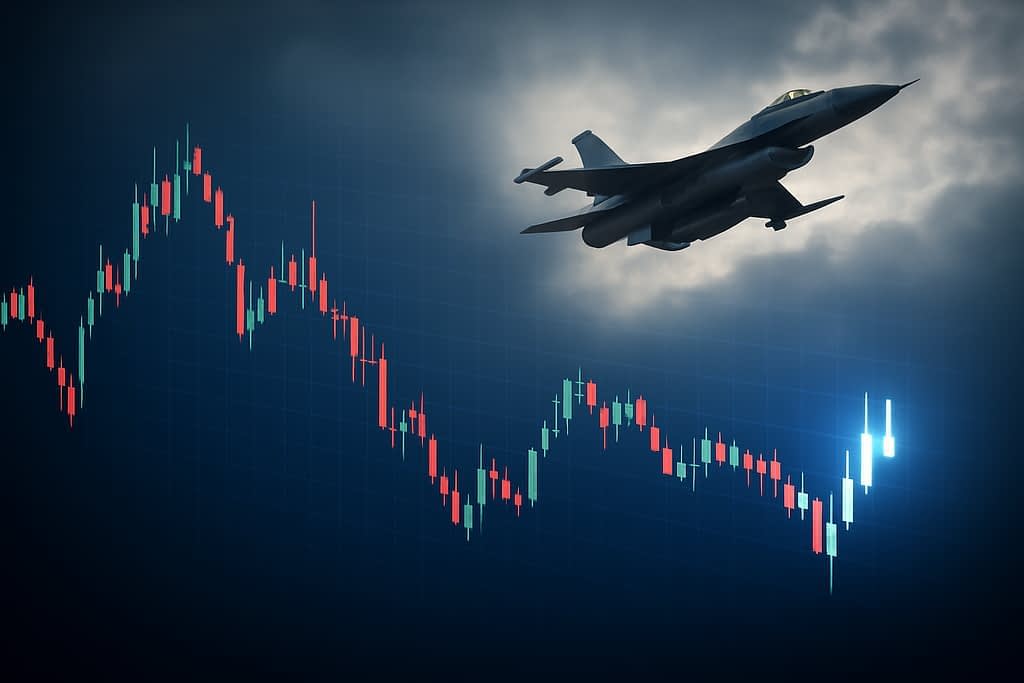For most of the public, Trump’s weekend meeting with Putin in Alaska was somewhat anticlimactic. The eagerly awaited summit did not bring us as close to a ceasefire as most of us would have liked, and it ended sooner than expected. No decision was made on lifting sanctions or imposing new, tougher sanctions on Moscow; Trump recently announced that they would be postponed for several weeks. The impact of these geopolitical moves was evident in the financial markets.
Global stock exchanges and their indices
All three key indices strengthened, but only slightly: the Nasdaq-100 futures rose the most, by 0.3%. US government bond yields also rose slightly across the board, as markets simply cannot help but follow political developments.
In contrast, the Russian stock market declined in many respects during and immediately after these negotiations. On Saturday, August 16, the Moscow Stock Exchange index fell by 2%, which was enough to reduce market capitalization by approximately 130 billion rubles. The Russian currency itself weakened on the foreign exchange markets: the dollar strengthened by 0.5% to 80.15 rubles and the euro by 0.9% to 93.76 rubles.
Among all the shares of state-owned companies of the Russian Federation, Gazprom fell by 2.9%, Rosneft by 2.6%, and the shipping company Sovcomflot by almost 3%. The decline also affected state banks, airlines, and metal producers and processors.
Stock market slump and optimism
It was impossible not to notice the more energetic reactions to Trump’s meeting with Zelensky, which followed shortly after Alaska at the White House. A particularly hopeful note at the end of this meeting was the US president’s statement that a peace agreement with the Ukrainian leader was already being actively worked on.
This hope for a better tomorrow found its parallel on European stock exchanges. The London FTSE 100 index rose and ended at 9,157 points on Tuesday morning. Food price inflation in the UK eased to 5%. Stock futures on other European markets also saw a slight increase on Tuesday morning.
However, Trump and Zelensky’s latest diplomatic maneuvers will not please investors in European arms manufacturers or aviation companies. Shares in the military industry in a number of European countries fell: for example, on Tuesday, shares in the Italian company Leonardo fell by almost 8%. Renk and Hensoldt in Germany and Saab in Sweden recorded declines of more than 7%. Unsurprisingly, the Stoxx Europe Aerospace and Defense Index recorded a loss of 1%.
It should be noted that since the beginning of the Russian invasion of Ukraine, European defense stocks have been rising as European countries have been arming Ukraine while strengthening their own capabilities in response to a possible further threat from Russia. This year, profits have increased due to concerns about the US commitment to European defense and in response to calls from the Trump administration for greater spending. As a result of this revival, shares in companies such as Saab, Hensoldt, and Renk have more than doubled since the beginning of 2025, despite Tuesday’s declines.
Peace talks and financial markets
Another expected item on Trump’s agenda is Zelensky’s meeting with Putin, which the US president wishes to organize in an effort to further accelerate the end of the war in Ukraine. This would be the first tête-à-tête meeting between the two heads of state since the start of the Russian-Ukrainian war approximately three and a half years ago. Trump said that this should precede their trilateral meeting. Zelensky said he was ready for such a meeting with Putin.
Some analysts argue that any possible outcome of the negotiations between Ukraine and Russia will lead to higher defense spending in Europe. Oil prices are expected to fall in the future, as a peace agreement is nearing completion, which will logically lead to the lifting of sanctions on energy imports from Russia and an increase in supplies to the world market. Overall, we could describe market developments after the recent summits as wait-and-see to cautiously optimistic. Until peace is secured and negotiations proceed without any breakthroughs, we do not expect any dramatic fluctuations on the stock markets either.




